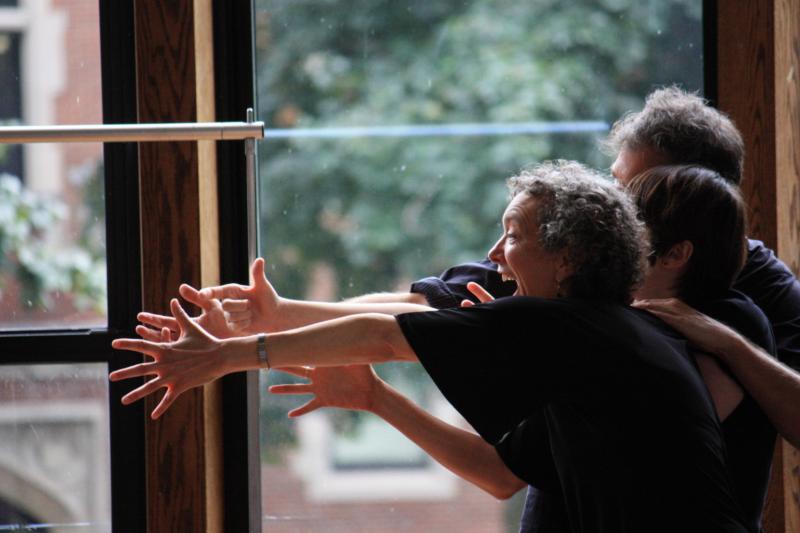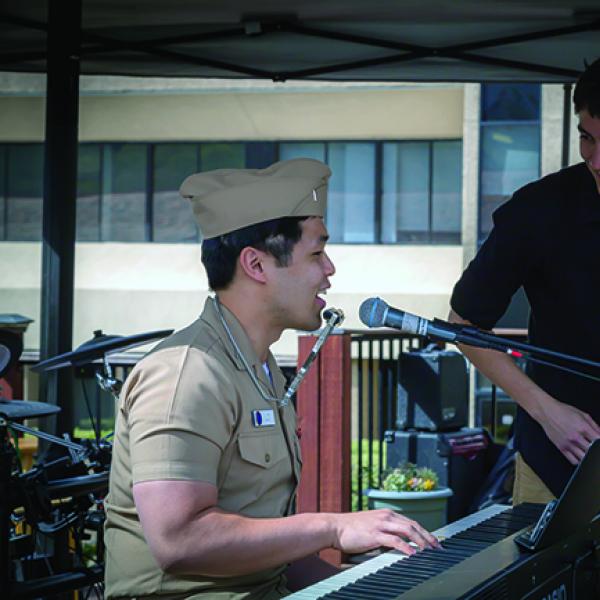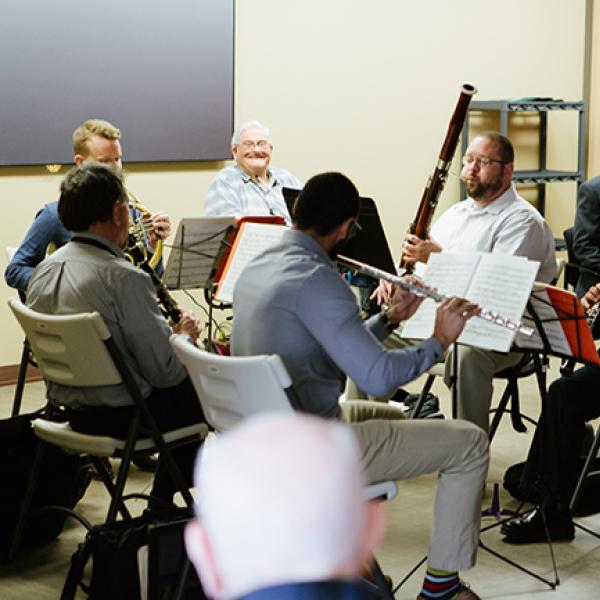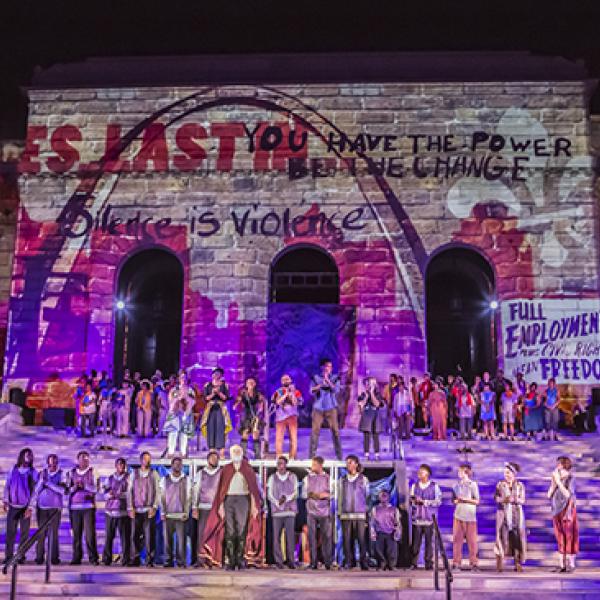True Story Theater: Building Community One Story at a Time

Participants of True Story Theater, an NEA grantee based in Arlington, Massachusetts. Photo courtesy of True Story Theater
True Story Theater has been performing in the greater Boston area for over 18 years. It’s an improvisational theater company that invites audience members to tell personal stories and then reenacts those stories on the spot. True Story, however, uses this creative practice to help bring communities together around important issues. Working with its hometown of Arlington, Massachusetts, and with grants from the National Endowment for the Arts, True Story Theater has created themed performances about issues from city planning to motherhood, from aging-in-place to opioid addiction. By listening to its audience participants carefully and distilling their stories to their essence, True Story Theater is creating a new kind of civic engagement—one in which listening is as valued as speaking. True Story Theater Founding Director Christopher Ellinger and Program Manager Amber Espar take us through the creative process and powerful results of these performances.
Jo Reed: Welcome to NEA Arts Online—I’m Josephine Reed
Christopher Ellinger: True Story Theater is a dramatic improvisational theatre ensemble that has been going for 18 years and focuses on telling the story of our community. So, we invite people to share experiences on the theme of any given performance, which usually focuses on a particular social theme. And, in the course of the performance, people who volunteer to share something from their experience get acted out their stories immediately by members of the ensemble through scene work, through movement, through music.
Amber Espar: The actors create this piece, a short improvised theatre piece in response, really landing-- what they’re tuning into is trying to truly, as best as they can, capture the heart: Why is this story important to this person right now? What’s needing to be reflected? And, so, they’ll create a piece and won’t be a very long piece at all, you know, maybe a minute or a couple of minutes’ long or even shorter for some of them. So people can experience what they’ve just shared right away as it is reflected back by the actors on stage. So, they have an immediate sense of being understood, heard, gotten in a very visceral way.
Christopher Ellinger: And then we always check back with the person who shared their story to see if it was accurate, if we really captured what was really important about their story to them. So, we’re modeling communication through theatre and modeling really good listening in a culture where people often don’t feel heard.
Amber Espar: When I describe True Story Theater I often share that it’s like an embodied empathy.
Jo Reed: That’s Christopher Ellinger and Amber Espar—he’s the founding director of True Story Theater and Amber is the program manager and will be stepping in as director for True Story Theatre on July first.
As you just heard, True Story theater is an improvisational theater company….it uses the techniques of playback theater which was begun in the mid 1970s and is now performed on six continents—it’s an original form of improv in which audiences tell stories from their lives and watch them enacted on the spot.
True Story Theater makes it home in Arlington Mass and gives about 100 performances and workshops a year mostly in the greater Boston area….it’s 24 member troupe performs for community groups, businesses, and individuals-- working with hospitals, universities, religious communities and town officials to strengthen communities by distilling and embodying the stories of its members. An NEA grantee since 2015, True Story has performed “playback” with various town committees to give city planners a deeper sense of residents ideas and needs, to increase civic engagement and to address pressing issues such as school diversity, mental illness, and the opioid crisis.
By enacting the stories and experiences of others through the creative process of Playback, True Story Theater creates the space for the audience to move past their own expectations and attitudes and really listen with an empathetic ear.
Christopher Ellinger: An essential part of what we do, part of our mission, is that people hear other people’s perspectives in a way that they normally can’t hear it. Because they’re hearing people’s stories, what’s true from what that person experienced. And you can often argue with other people’s perspectives when it’s put polemically, but when you hear people’s stories, it really hits home. So, people often after a show, they feel connected to other people that they normally don’t have connections to, people whose experience is really different from theirs.
Jo Reed: Every show True Story Theater presents is based on a theme—a school, for example, might invite them to present a performance themed around diversity for teachers and parents, a church group might ask for a performance about motherhood and work. The town planning committee might want an evening to focus on the building of a new high school. The list of possibilities is long and varied. Amber Espar.
Amber Espar: One of the themes that I found really powerful for us to work with was the theme of stories of invisible identities. And this has opened up a space to share often things that are very important to each individual that other people don’t necessarily know or see. We’ve worked with a commission on disability here in Arlington and did a show with sort of that theme, but stories of visible and invisible disability. So, people were sharing stories around-- especially around the stigmas around mental health.
Christopher Ellinger: And to have people’s experience fully honored in dramatizing their stories, their struggles with all kinds of mental health issues that are often embarrassing to share with other people. Their struggles as human beings, their resourcefulness as human beings, because we’re not looking to reflect back just the struggle. We’re looking to reflect back people’s strengths was so moving to people and gave other people compassion for what people with mental illness have to go through. And, also, another side of this was not only what healing came for the individuals who shared stories, but also that we heard that the commission on disabilities focused mostly on physical disabilities. So, to get to hear about this more invisible disability that people with mental health issues go through increased their concern to focus on this.
Jo Reed: How many stories are you likely to go through in a single session?
Amber Espar: In a typical show, there’s about 10 to 12 stories that we’ll have time-- so, 10 to 12 people will be asked to share something from-- a moment from their lives and it doesn’t have to be a prepared story at all. In fact, we actually say, “Please, you don’t even need to know what you’re going to say. Just come and explore with us on this theme. How does this affect you personally in your life. What are some of the things that when you look into this theme that bring up for you?” And sometimes we’ll even begin a show just with saying, “What is it like to step into this room together with us knowing we’re going to explore stories of stigma or stories of invisible identity or stories of motherhood?” And people will be sharing things about feeling excited and get a little bit nervous or anxious, because this story feels very personal or this issue is something that they've grappled with all their lives and haven’t really felt heard before. So, we’ll begin there and then as we move forward into the evening we’ll invite people to share more and more details about their experiences and the reflections that we go through, the theatre will be a bit-- will be sometimes a longer piece. So, by the end of the evening, yeah, about 10 to 12 people have shared their stories and since it’s one of our commitments is that people all have a chance to have their voices heard. During the show, we’ll have moments where people can turn to another person, another participant of the evening and share what’s on their mind.
Christopher Ellinger: So, what’s exciting and a little edgy about our theatre is how interactive it is. So, we not only invite people from the audience to step up and volunteer their experiences that we’re going to act up and there’s not going to be any action unless people from the audience tell their stories. But we also at various points are looking at how can we connect to the audience in a way that people are going to feel that they’re a part of the same community of sharing on this and exploration on this important social issue. So, for example, somebody’s just shared a painful moment, we might say, “Who else here has experienced something like that? Raise your hand.” And the person who’s just been sharing, who’s just been feeling very isolated looks around and sees how many other people indeed feel the same way that they did.
Jo Reed: In 2015, you received a grant from the NEA to work with volunteer committees that engaged in town planning. Tell me about this project and how True Story Theater operated in it.
Christopher Ellinger: We started this project supported by the NEA to work with different volunteer commissions and groups in the town and quickly learned how much of the work in a community gets done by volunteers. It just staggered us and moved us how many people were working so many hours including people who had full-time jobs and were parents. So, we started with five different community partners. We ended up working with 15 different volunteer organizations. So, there were two purposes. One was to help them tell the story of their work, so people could know what they were doing. And often they didn’t have a really dramatically engaging way to share the story of what they did. And since we’re a theatre group that's what we helped them do. So, both to learn to be spokespeople and to do public shows with them so that people could hear stories from the impact of their work. So, that was the heart of what we did in that project and it was actually tough initially with that project, because a lot of the groups were like, “Oh, that’s great that you got this grant. Sure, we’ll work with you,” and there might be one person who came to one of our shows and was inspired by what we did, but most of the people on those groups were, like, “Well, I don’t really get how we would work with the theatre company.” So, it took us a lot of the-- most of the first year for them to get onboard with how to work with us.
Jo Reed: And then once they did, did you get them?
Christopher Ellinger: Once they did, yes! Once we did, we got them and we also did-- some of what we did also was getting to work with just the committees and the commissions themselves, where they go to tell the story of why did they join that committee. So, why-- you’re on the Human Rights Commission. Why does this matter to you? And they had never told that story to each other before. And it was so powerful and it helped shape the direction of their strategic planning to do that kind of story sharing with us that we got to, again, act out.
Jo Reed: Who would be in that room when you would do their stories? Were residents, community members there? Or were you doing it for the committee members themselves and with them?
Amber Espar: So, during the two-year grant -- this was the Living Brochure Project with the Arlington Town committees. Some of our events were just for the committee members. So, for example, with the Human Rights Commissioners-- all had a chance to basically share their origin stories with each other. And then, additionally, we would host public forums, public performances that would be in partnership with one of the town committees; for example, the diversity task group in town, we did stories of stigma and had times for people to share, you know, what pieces of their identity sometimes are-- has to be hidden from view, places where they’ve not felt welcomed, and also moments of being welcomed when we’ve been able to have a town that invites these different qualities and identities and aspects of ourselves.
Jo Reed: In 2018, True Story Theater received another two-year grant from the NEA.
Christopher Ellinger: So, getting a second grant was fantastic, because we got to start off at a whole other place of buy-in from different partners that we wanted to work with.
Amber Espar: So, this project, we were calling it the Listening Project and it’s to strengthen civic dialog through this form of storytelling theatre. And, so, we’re using this theatre, this interactive form of theatre to facilitate respectful listening, especially around challenging issues. And, so, with this project we were really excited to be working directly with the Town of Arlington and the planning department to be able to look at a whole myriad of what’s happening in the town, everything from some of the work that the town is doing to increase transportation.
Jo Reed: Yes, you heard that correctly—transportation. The town of Arlington held True Story Theater’s work in such high regard, it asked them to create a show about transportation…which was an issue in the town. That request gave even True Story Theater pause.
Christopher Ellinger: None of us were sure how well is this going to work to facilitate the kind of dialogs on some of the topics that they wanted to bring in.
Amber Espar: No, I remember-- I thought you’d bring that-- I remember feeling like, “Oh, my gosh, we can do this theater that really brings people’s hearts and their minds and say really what’s going on for them. How are we going to do a show that’s around transportation?” Being like, “What?” We’re in the room with the people, the staff who’ve been working for months to try a pilot program around a rapid transit bus line and the stories that are emerging are really poignant to me about the level of work and commitment that goes into inching a town forward in its infrastructure, in its transportation.
Jo Reed: Some residents apparently had concerns about bringing rapid transit in; but, True Story Theater was not there to advocate for one position or another; they are not there to persuade them or to assuage their fears.
Christopher Ellinger: So, we are not solving any problems. We tell them that at the beginning. The planning department will take everybody’s input and work on figuring out what the proposals are going to be. We’re looking to create a space where different perspectives can be heard and where people can be totally upfront about whatever they’re feeling. There were some people who were concerned about losing their parking spaces, because the bus is taking over one of the lanes that had some parking in them. There are some business owners who are really scared that they’re going to lose some business-- again, because people aren’t going to park right in front of their store. I’m just giving examples of things that came up. And we have no idea what’s going to come up and still looking to make it real for people that their experience matters to us by how we dramatize it.
Amber Espar: So, after the bus rapid transit show we spoke to one participant who is a lifelong resident in the town and during this show they said that “I don’t usually speak up at public meetings, partly because I’m concerned I won’t be heard in the way I intend, but at the True Story event, I experienced something unique that made me willing to share my views.”
Christopher Ellinger: And then one of the town planners said, “People so often come to meetings with an invested position, either pro or con. Often they’re not able to express their concerns without provoking strong emotional reactions and anxiety from others. Having you come as a neutral third party and as artists helped participants to trust they were heard and diffuse tension for everyone.”
Jo Reed: Because True Story Theater disengages from arguments about issues—who’s right; who’s wrong and simply acts out people’s experience of it, it creates a new way for people to engage about issues that are important in their lives.
Christopher Ellinger: Whereas so often people come to these public forums and are saying the same thing over and over again.
Jo Reed: Yes, and I was going to say they’re also not listening! I’ve fallen into that trap: I’m rehearsing what I’m about to say, so I’m not really listening to what you’re saying.
Amber Espar: Right, exactly. I think there’s something that the format, which I think is sort of this ritual of deep listening and a ritual of acknowledging each person’s experience, is important. So, there’s some way that we are slowing down time. We are pausing the way that we often interact with people, which, exactly, is we’re waiting to say, “What are we going to say next?” or “do I agree or do I not agree?” versus just saying, “we’re going to focus right now on this person’s experience and we’ll hear what is important to them.
Jo Reed: Yeah. And I know with the present project that you’re working on, the Listening Project, you’re doing work around the opioid crisis being in your community. I mean, as in all communities throughout the country, but you’re focusing some attention there. How are you planning to do that?
Christopher Ellinger: We just did our first show in the middle of December in partnership with our local police department and a Boston project outreach committee with several towns that was on facing addiction and building committee resilience. So, I was looking not only at opioids, but other addictions that people are struggling with or having family members who are trying to support people who are struggling. So, it was a very powerful show. We were told by the social worker at the police department that she didn’t know of anybody in any of the local towns that were doing something right before the end-of-year holidays that was dealing with this theme and providing support for people. And the holidays are a time when a lot of people with addiction are really struggling. They feel like they’re supposed to be happy and other people are celebrating, but they’re feeling the depth of their pain. So, having a space for people to come and share with each other really vulnerably about what’s real for them or family members share about their pain, about family members who are struggling with addiction, and some of the service providers who are also really stressed out was a really beautiful place for people to feel each other’s support. So, we’re--
Amber Espar: Particularly when we start to share stories about addiction, I feel like it’s something that pretty much touches every single person in some way. And one of the ways that we as artists, as actors who are going to be holding the stories shared by audience members, one of the ways that we prepare is by sharing our own experiences, sharing about either something very personal on this topic to our own lives or to-- that we’ve experienced individually or that we’ve experienced among our family constellation.
Christopher Ellinger: We also are preparing to deal with very tricky, difficult subjects like trauma or things that are raw for people by learning not to reenact things that could be triggering for people. So, we find artistic ways to acknowledge the full level of somebody’s despair, what they’re going through internally without showing what’s happening on the outside. Like, we’re not going to show somebody puncturing themselves with a needle or snorting coke. We’re going to show what’s going on inside them.
Jo Reed: I’m curious about what you see in the community of Arlington and if you’re able to see sort of ways that True Story Theatre really has had an impact in terms of helping to make that community more neighborly.
Christopher Ellinger: I think our community partners have been surprised and delighted by how effective using this interactive theatre is to enable greater listening in these public forums. So, it’s not-- it’s both the slowing down through the ritual of “Let’s hear somebody share a story,” then there’s a dramatization, then we check back with the person who shared their story. So, there is that fullness of communication of checking back, but there’s also a magic that transports people when people see theatre bring the stories to life, where you can stop getting into your left brain, “I’m trying to make a point,” and just going for the ride of “I’m sharing in other people’s stories.” Like, you’re in this instant movie from the stories of all the people in the room who are chiming in about this common experience.
Amber Espar: And what I’ve just been amazed by and delighted by is that through these-- being able to do this work over now several years that there’s this understanding that people have who we’ve partnered with that know that this True Story Theatre is now a resource. And, so, we’ve gotten calls saying, like, “Ah, this is coming up. We’re going to be having a meeting and we’d love for you to support this conversation.” So, that’s been really thrilling to see how the community, how people in Arlington see True Story Theatre as a resource to share the work that they’re doing to make this town a more welcoming place for all.
Christopher Ellinger: One change that I am excited about that’s still in process and I really hope it deepens over the next few years is having artists see our work and say, “How can arts be part of civic life in different ways that are usually thought of for artists?” So, not just doing the Saturday night performance as part of a conference, but how can it be part of a process of community dialog?
Jo Reed: That’s Christopher Ellinger and Amber Espar—he’s the founding director of True Story Theater and Amber is the program manager she’ll be stepping in as director for True Story Theatre on July 1. You can find out more about True Story Theater at True Story Theater.com. And you can find more about the NEA and the wide range of projects we support at arts.gov. For NEA Arts On-Line, I’m Josephine Reed. Thanks for listening.
Music credit: “Renewal” composed and performed by Doug and Judy Smith. Used courtesy of Doug and Judy Smith.





